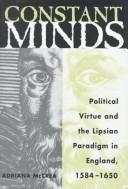| Listing 1 - 2 of 2 |
Sort by
|

ISBN: 0802006663 Year: 1997 Publisher: Toronto University of Toronto press
Abstract | Keywords | Export | Availability | Bookmark
 Loading...
Loading...Choose an application
- Reference Manager
- EndNote
- RefWorks (Direct export to RefWorks)
Constancy --- Philosophy, English --- Political science --- Stoics --- Virtue --- Conduct of life --- Ethics --- Human acts --- Philosophy, Ancient --- Political philosophy --- Loyalty --- Philosophy --- Lipsius, Justus --- Lipse, Juste --- Lips, Joose --- Lips, Josse --- Lipsio, Giusto --- Lipsio, Justo --- Lips, Joest, --- Lipse, Juste, --- Lipsii, Justi, --- Lipsio, Giusto, --- Lipsius, I. --- Lipsius, Iustus, --- Lipsius, J. --- Influence. --- England --- Intellectual life --- Thematology --- Bacon, Francis --- Jonson, Benjamin --- Hall, Joseph --- Greville, Fulke --- Raleigh, Walter
Book
ISBN: 1282003135 9786612003134 1442673281 Year: 1997 Publisher: Toronto, [Ontario] ; Buffalo, [New York] ; London, [England] : University of Toronto Press,
Abstract | Keywords | Export | Availability | Bookmark
 Loading...
Loading...Choose an application
- Reference Manager
- EndNote
- RefWorks (Direct export to RefWorks)
In response to the crisis provoked by the Wars of Religion in Europe in the sixteenth century, the Flemish philosopher Lipsius developed a synthesis of stoic morality and Tacitean political analysis called 'the Lipsian paradigm,' or neostoicism. The paradigm espoused the adaptation to prevailing political circumstances, the practice of 'mixed prudence,' (knowing the circumstances in which to apply deceit) and the use of historical example as a guide to contemporary action as political virtues.Constant Minds investigates the reception and use of Lipsian ideas in the moral, political, and literary culture of late-sixteenth- and early-seventeenth-century England through examination of the writings and activities of Walter Ralegh, Francis Bacon, Fulke Greville, Ben Jonson, and Joseph Hall. Adriana McCrea demonstrates how this continental school of thought permeated the political ideas of these English writers, and places her study in the contexts of the literary conventions of the humanist tradition, the political events of the time, and the activities and circles of the authors themselves. McCrea's study fuses intellectual history with political history and literary analysis, prompting new questions about the nature of English Renaissance humanism and political perception in England during the early modern period.
Philosophy, English --- Stoics. --- Constancy. --- Virtue. --- Political science --- Philosophy. --- Lipsius, Justus, --- Influence. --- England --- Intellectual life --- Neo-Stoicism
| Listing 1 - 2 of 2 |
Sort by
|

 Search
Search Feedback
Feedback About UniCat
About UniCat  Help
Help News
News